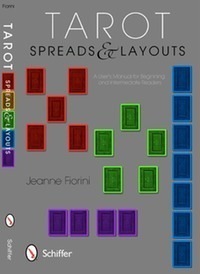By Jeanne Fiorini
By the time this article is scheduled to be published, the TV episode to which I’m referring may be available on YouTube or elsewhere without the copyright restrictions that are currently in place. If you didn’t catch the “Tarot Reader” episode of ABC’s sitcom Raising Hope (Season 2/ Episode #13, ironically), take the time to do so and make up your own mind as to the degree of its offensiveness.
I will fess up to watching this show on a regular basis. I appreciate the Roseanne-esque nature of this quirky family and find their whole thing absurd and heartwarming at the same time. It’s fortunate that my daughter also enjoys Raising Hope because on the night in question she telephoned to alert me that not only was the show about to begin, but that the topic of the night was Tarot. Quickly I reached for a notepad and assumed my position on the futon.
Virginia, a grandmother before the age of 40 (played by Martha Plimpton), is having a money crisis in addition to being depressed about “missing her calling.” (No surprise regarding either of these issues, being that she does a not-so-good job of cleaning houses for a living.) While accompanying a friend in search of love-life advice, she observes a crass, loud-mouthed “Psychic Reader” palming wads of cash from gullible clients. Virginia’s problems are solved.
It’s perfect! Virginia always wanted to be her own boss, being “bossy by nature,” and figures Tarot reading is a great way to meld all her talents into one profession. She hastily posts her neon sign in the window and proclaims, “Now we wait for the idiots.”
Initially I took issue with that comment, until I saw her clients. This is not to say that there weren’t potentially-objectionable depictions before this point:
- A stranger has the secret and magical answer to the dilemmas of life.
- Readers are a demanding, rude, and abrasive lot.
- Psychics are ready and willing to accept payment (cash only, please) for bogus information.
- Beaded curtains and tacky furnishings are a prerequisite for the trade.
The clients who seek Virginia’s brand of guidance are a hapless bunch. Blindly trusting, they swallow everything that Virginia spews, all of which is rooted in her own opinion of what they should do: “Cut that rat tail!” “Neuter your truck!” “Call your mother!”
- Readers are allowed to tell you what to do because they're all knowing.
- Readers tell you what you want to hear so you will pay them.
And perhaps the worst cut of all:
- Clients who seek out the advice of Tarot readers are idiots and therefore deserve what they get.
At least the writers stayed true to card meanings in this segment of the episode, in that Virginia is waving around the King of Swords for the truck neutering (you had to be there), the Queen of Cups for the mother-calling, Three of Swords was in the mix involving a love triangle, etc.
As Virginia soon discovers, there’s a lot of responsibility that goes along with telling people what to do. Initially, she’s very impressed by this: “Now people sit up and listen [to me], like I’m a god … or Judge Judy.” But soon she sees the havoc she is wreaking by the misuse of her gifts, and as fast as that neon sign went up, it comes down. “It’s too much pressure! Too much power!”
Some Tarot professionals are going to see this episode and be outraged. The thing is chocked full of those familiar and persistent stereotypes, and I wouldn’t blame anyone for being pissed. For me, the worst insinuation was that anyone who goes for a Tarot reading must be woefully ignorant, pathetically helpless, misguided, and ill-informed. This hurts everyone involved in all sorts of ways.
But in a back-handed kind of way, some good points were made:
- There is a lot of power and responsibility that goes along with being a reader. Both the reader and the client need to be aware of this fact.
- A reader's motivation counts: Is it about the power? Money? Self-importance? A lack of anything better to do?
- Idiot readers attract idiot clients and vice-versa.
- We all reap what we sow: readers, clients, and everyone in between.
All in all, I’d give this episode of Raising Hope a “7” on the offensiveness scale, an “8” on the net value scale, and a “9” on the entertainment/interest scale. Tarot has a lot of trouble being taken seriously, and this little melodrama probably didn’t help matters. But the Tarot, like an elusive dream, does manage to regularly float to the surface of American popular culture. If you happened to have seen the episode, I’d be interested to hear your thoughts.

